Magento developers are the backbone of e-commerce platforms, ensuring that online stores are not only visually appealing but also functionally robust. They work on creating, customizing, and managing Magento-based websites to provide a seamless shopping experience for users.
Skills required for a Magento developer include proficiency in PHP, MySQL, and JavaScript, as well as familiarity with the Magento platform itself. Additionally, they need to have strong problem-solving abilities and effective communication skills to collaborate with other team members.
Candidates can write these abilities in their resumes, but you can’t verify them without on-the-job Magento Developer skill tests.
In this post, we will explore 9 essential Magento Developer skills, 11 secondary skills and how to assess them so you can make informed hiring decisions.
Table of contents
9 fundamental Magento Developer skills and traits
The best skills for Magento Developers include PHP Proficiency, Magento Architecture, MySQL Knowledge, JavaScript Skills, HTML/CSS, API Integration, Version Control Systems, Magento Customization and Performance Optimization.
Let’s dive into the details by examining the 9 essential skills of a Magento Developer.
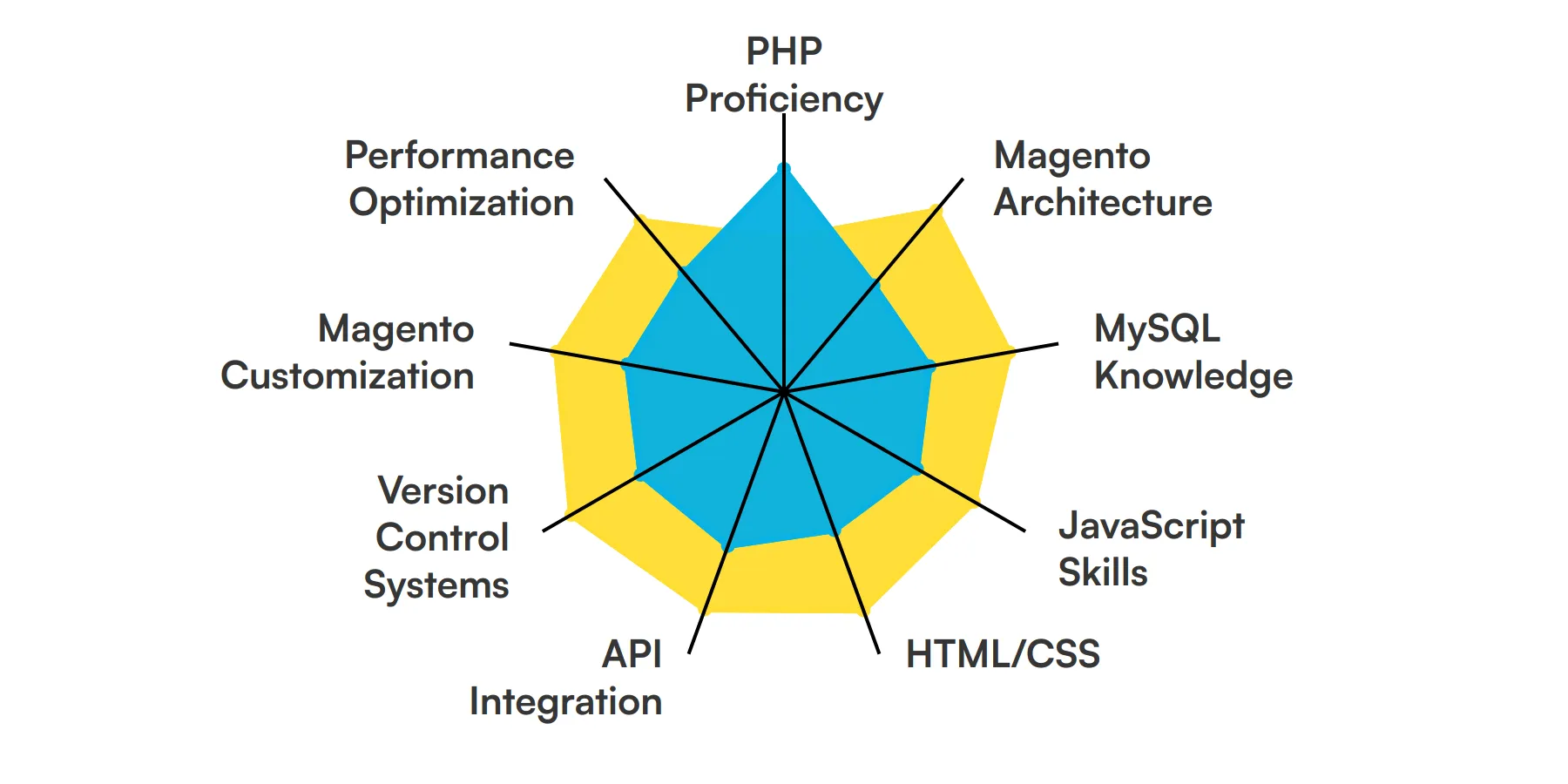
PHP Proficiency
A Magento developer must have a strong command of PHP, as Magento is built on this scripting language. This skill is crucial for writing custom modules, extending Magento functionalities, and troubleshooting issues.
For more insights, check out our guide to writing a PHP developer Job Description.
Magento Architecture
Understanding the Magento architecture is key for any developer in this role. This includes knowledge of its modular structure, MVC framework, and dependency injection, which are essential for building scalable and maintainable applications.
MySQL Knowledge
Magento relies heavily on MySQL for data storage. A developer needs to be adept at writing and optimizing SQL queries, managing databases, and understanding database design to ensure efficient data handling.
Check out our guide for a comprehensive list of interview questions.
JavaScript Skills
JavaScript is used extensively in Magento for front-end development. Proficiency in JavaScript, along with libraries like jQuery and frameworks like Knockout.js, is necessary for creating dynamic and interactive user interfaces.
HTML/CSS
A solid grasp of HTML and CSS is required to design and style the front-end of Magento stores. This includes creating responsive designs and ensuring cross-browser compatibility.
For more insights, check out our guide to writing a HTML5 Developer Job Description.
API Integration
Magento developers often need to integrate third-party services via APIs. This skill involves understanding REST and SOAP APIs, and how to implement them within the Magento framework.
Version Control Systems
Knowledge of version control systems like Git is essential for managing code changes, collaborating with other developers, and maintaining a history of project development.
Check out our guide for a comprehensive list of interview questions.
Magento Customization
Customizing Magento to meet specific business needs is a common task. This includes creating custom themes, modules, and extensions to enhance the functionality and appearance of the store.
Performance Optimization
Ensuring that a Magento store runs smoothly and efficiently is crucial. This involves optimizing server performance, caching strategies, and code optimization to handle high traffic and large product catalogs.
11 secondary Magento Developer skills and traits
The best skills for Magento Developers include Linux Command Line, SEO Best Practices, Payment Gateway Integration, Security Practices, Debugging Tools, Unit Testing, Cloud Services, Responsive Design, Content Management, Project Management Tools and Customer Support.
Let’s dive into the details by examining the 11 secondary skills of a Magento Developer.
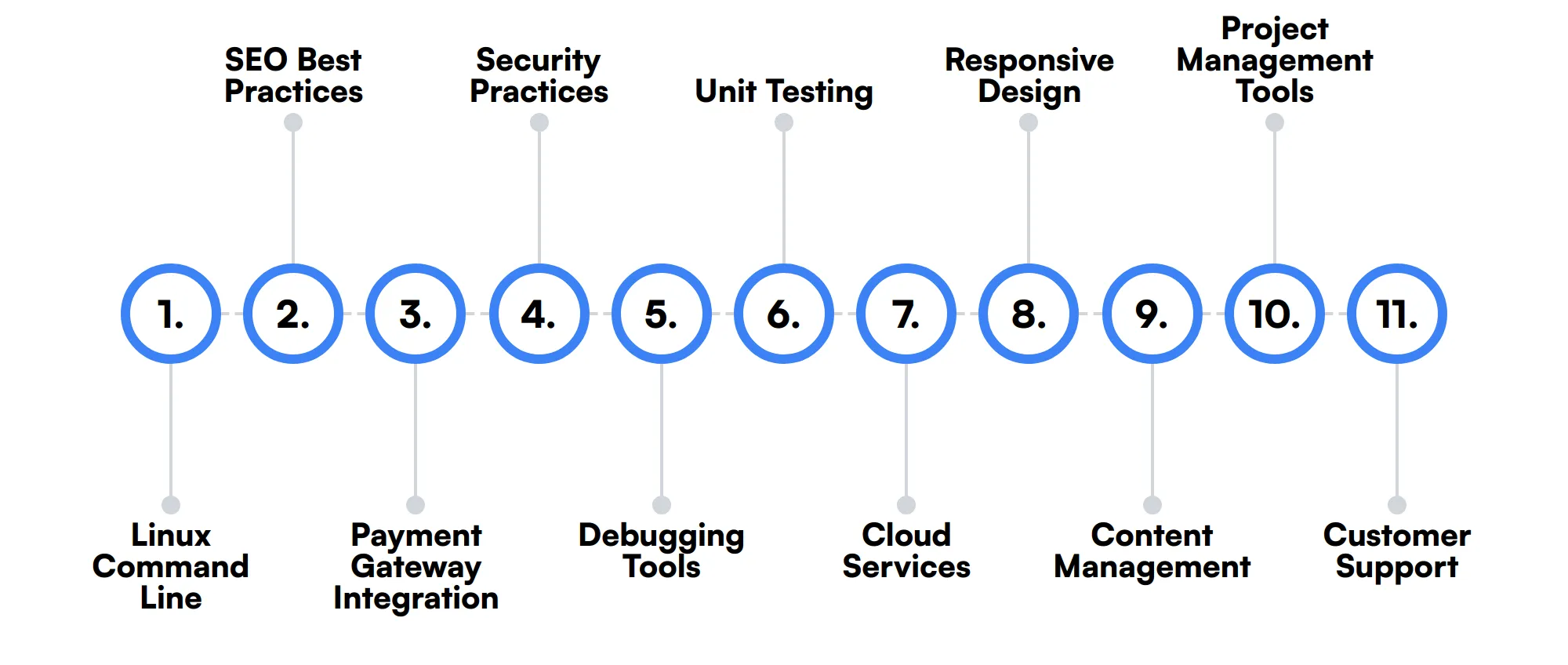
Linux Command Line
Familiarity with the Linux command line is beneficial for managing servers, deploying applications, and troubleshooting server-related issues.
SEO Best Practices
Understanding SEO best practices helps in optimizing Magento stores for search engines, which can drive more organic traffic and improve visibility.
Payment Gateway Integration
Knowledge of integrating various payment gateways is useful for providing customers with multiple payment options and ensuring secure transactions.
Security Practices
Implementing security best practices is important to protect Magento stores from vulnerabilities and attacks. This includes knowledge of data encryption, secure coding practices, and regular security audits.
Debugging Tools
Proficiency with debugging tools like Xdebug can help in identifying and resolving issues quickly, ensuring a smooth development process.
Unit Testing
Writing unit tests ensures that code changes do not break existing functionality. Familiarity with testing frameworks like PHPUnit is beneficial for maintaining code quality.
Cloud Services
Experience with cloud services like AWS or Azure can be advantageous for deploying and scaling Magento applications in a cloud environment.
Responsive Design
Creating responsive designs ensures that Magento stores provide a seamless user experience across various devices, including desktops, tablets, and smartphones.
Content Management
Understanding how to manage and organize content within Magento can help in maintaining a well-structured and user-friendly store.
Project Management Tools
Familiarity with project management tools like JIRA or Trello can aid in tracking development progress, managing tasks, and collaborating with team members.
Customer Support
Providing technical support to clients and resolving their issues promptly is an important aspect of a Magento developer's role, ensuring customer satisfaction and smooth store operations.
How to assess Magento Developer skills and traits
Hiring the right Magento developer is a key step in ensuring the success of your e-commerce projects. These professionals need a broad set of technical skills, from PHP proficiency to expertise in Magento architecture. But how can you accurately assess these skills to ensure you're selecting the best candidate for the job?
Traditional interviews and resume screenings might not fully reveal a candidate's true abilities in areas like MySQL, JavaScript, or performance optimization. This is where skills assessments come into play. By using targeted tests, you can measure a candidate's practical knowledge and problem-solving skills directly related to your needs.
Using Adaface assessments can help streamline this process significantly. These tests are designed to reflect real-world issues and scenarios that a Magento developer might face, ensuring that you're evaluating the skills that matter most. With Adaface, you can achieve an 85% reduction in screening time. Check out their Magento developer tests here.
Let’s look at how to assess Magento Developer skills with these 6 talent assessments.
PHP Online Test
Our PHP Online Test evaluates candidates on PHP fundamentals, object-oriented programming techniques, and error handling. This test is designed to assess a candidate's ability to write and structure PHP code effectively.
The test covers PHP fundamentals, OOPs, built-in and custom functions, sessions, error and exception handling, and database handling. It includes scenario-based MCQs and a coding question to gauge hands-on programming skills.
Successful candidates demonstrate a strong understanding of PHP coding practices, error handling, and database interactions.
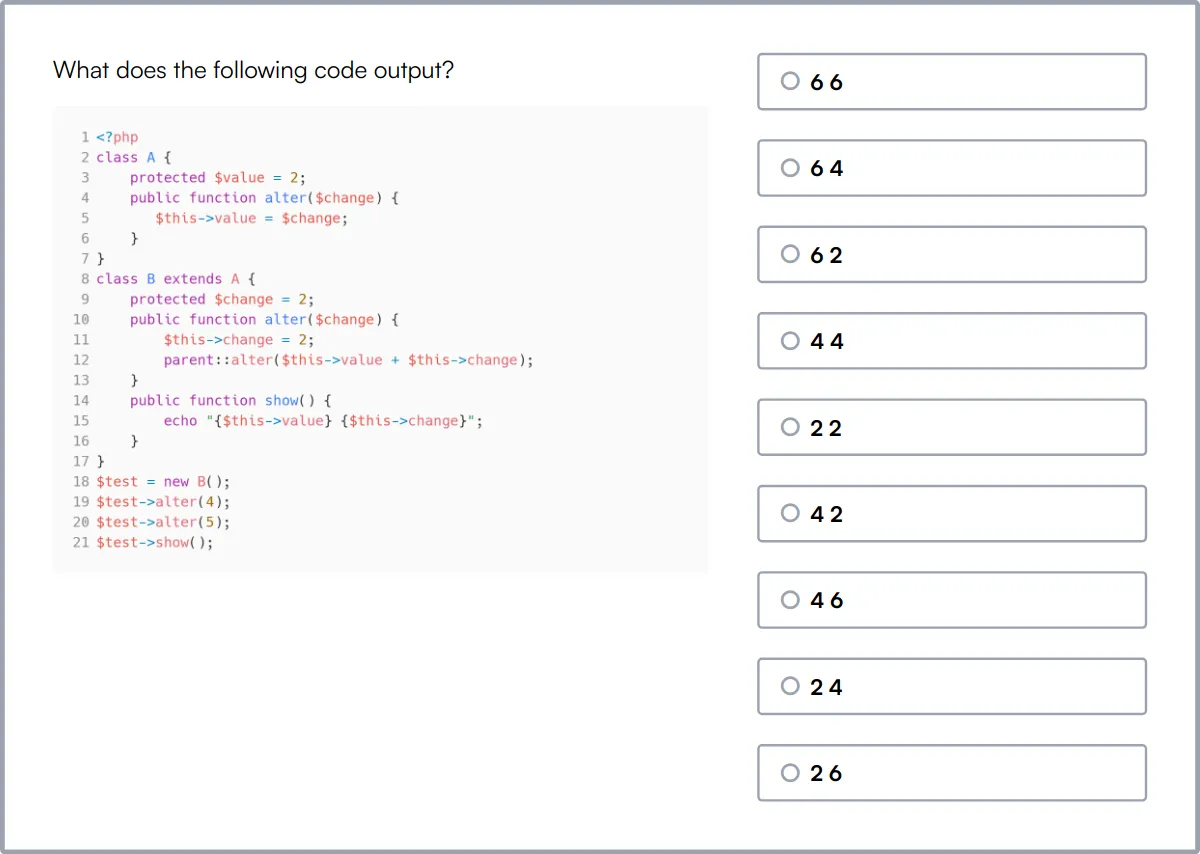
Magento Online Test
Our Magento Online Test assesses a candidate's technical knowledge and practical skills in Magento development. This test is crucial for evaluating proficiency in various aspects of Magento, including architecture, installation, and customization.
The test covers Magento architecture, installation and configuration, themes and templates, extensions and modules, frontend and backend development, database and data models, APIs and web services, and performance optimization. It includes scenario-based MCQs and a coding question.
Candidates who perform well show expertise in Magento development, including customization, performance optimization, and security.
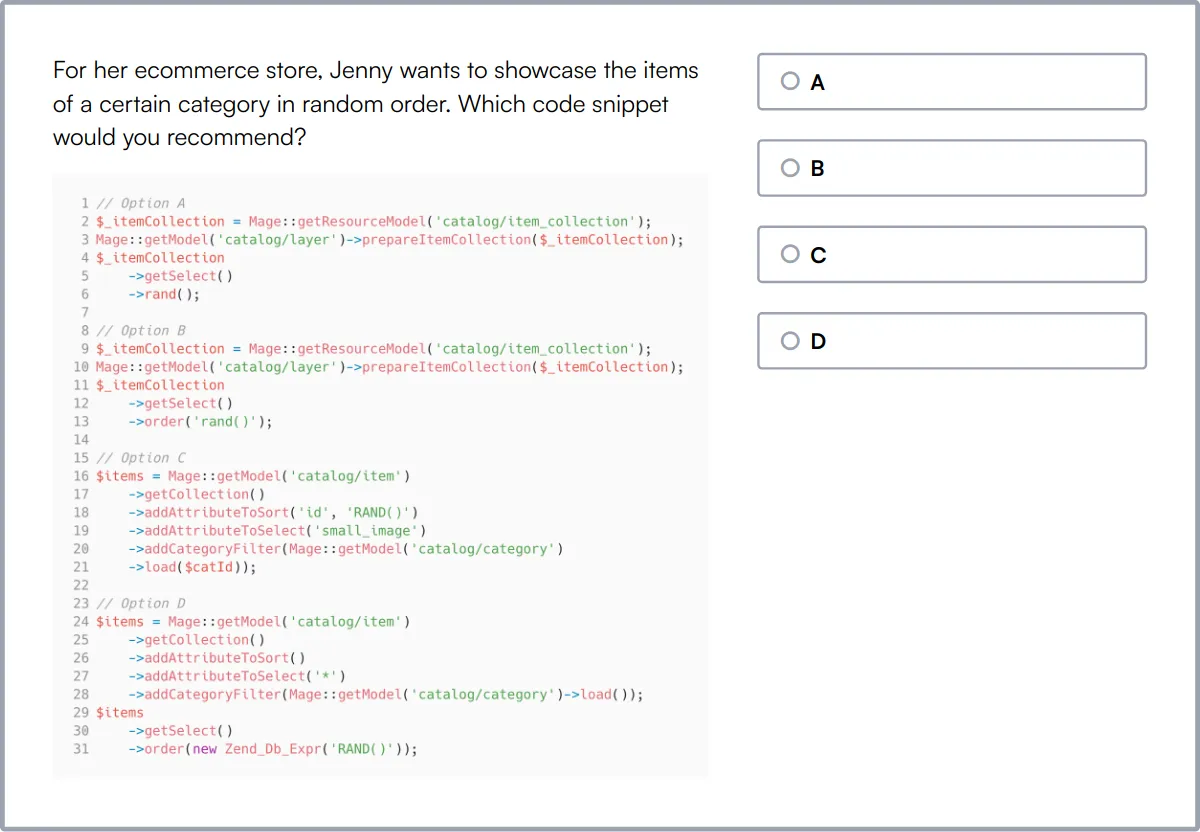
MySQL Online Test
Our MySQL Online Test evaluates a candidate's proficiency in using MySQL for database management. This test is designed to assess knowledge of SQL queries, database design, and data manipulation.
The test covers MySQL, database design, SQL queries, normalization, indexing, joins, data manipulation language, data definition language, views, stored procedures, triggers, and transactions. It includes scenario-based MCQs.
High-scoring candidates demonstrate a strong understanding of database design principles, efficient query writing, and data manipulation techniques.

JavaScript Online Test
Our JavaScript Online Test gauges a candidate's skills in JavaScript, including ES5 and ES6 fundamentals, DOM manipulation, and asynchronous programming. This test is essential for evaluating front-end development capabilities.
The test covers JavaScript basics, structuring and styling HTML DOM, errors and exception handling, working with user data and JSON, ES6 features, higher-order functions and closures, OOP, asynchronous JavaScript, and handling APIs. It includes scenario-based MCQs and a coding question.
Successful candidates show proficiency in JavaScript programming, including modern ES6 features, asynchronous operations, and DOM manipulation.
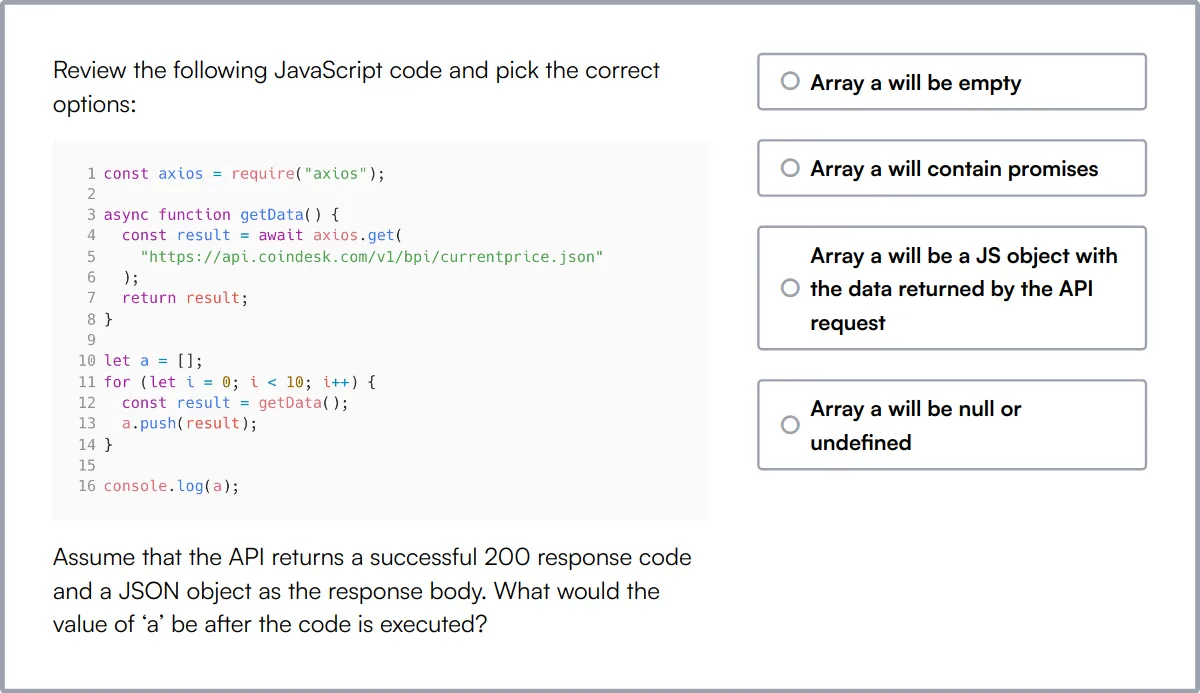
HTML/ CSS Online Test
Our HTML/ CSS Online Test assesses a candidate's ability to create and style web pages using HTML and CSS. This test evaluates knowledge of core HTML tags, forms, and CSS styling techniques.
The test covers core HTML tags, handling HTML forms, core CSS concepts, styling HTML elements, Flexbox and Grids, responsive design, working with images, custom fonts, and CSS-based animations. It includes scenario-based MCQs.
Candidates who perform well demonstrate a strong understanding of HTML and CSS, including responsive design and modern layout techniques.
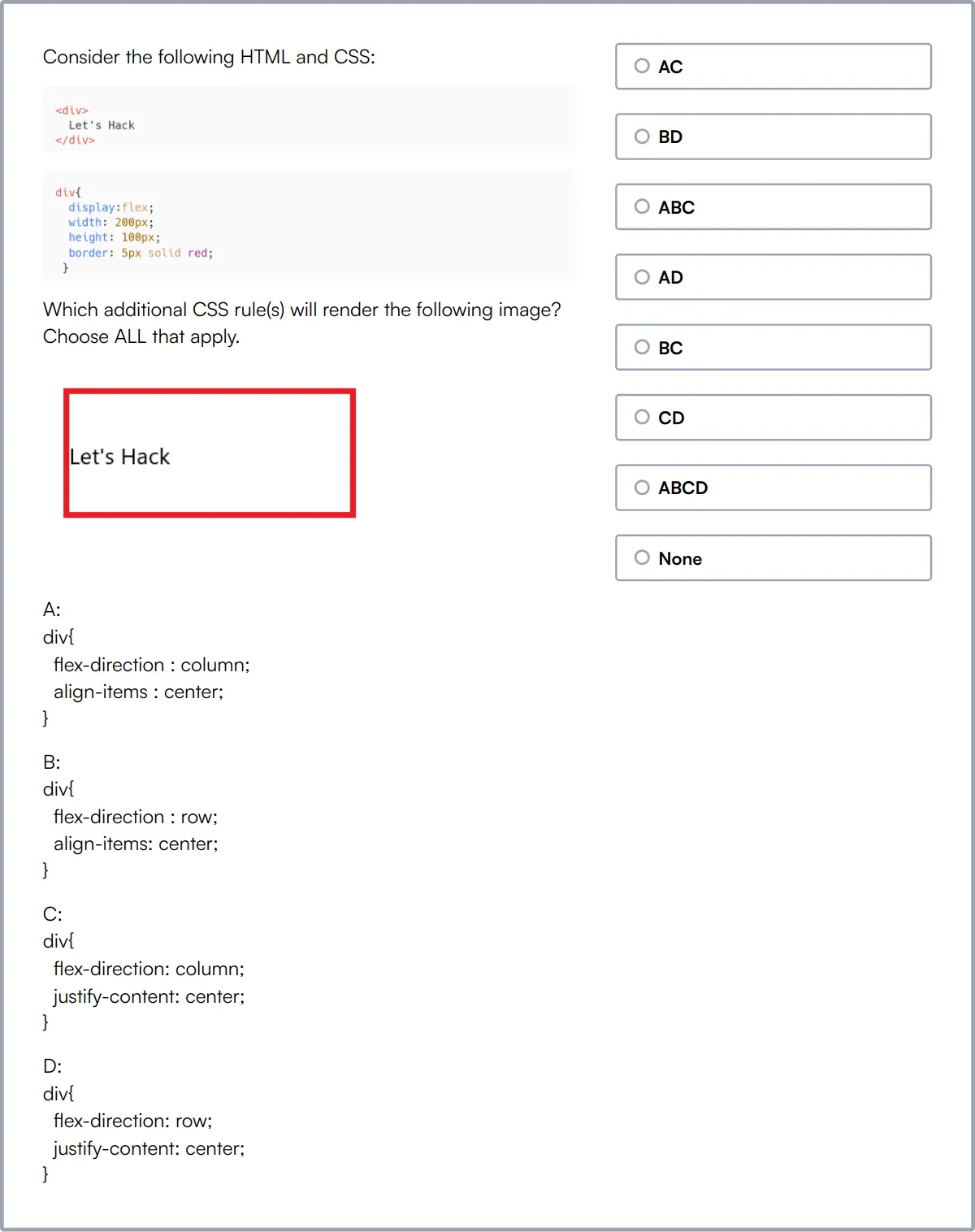
REST API Test
Our REST API Test evaluates a candidate's understanding of RESTful APIs and their ability to create, interact, and test them. This test is designed to assess knowledge of REST principles and best practices.
The test covers technical aptitude, API integrations, REST API basics, API design, best practices, designing backend services, and coding. It includes multiple-choice questions and a coding question.
High-scoring candidates demonstrate proficiency in designing and interacting with RESTful APIs, including understanding HTTP methods, status codes, and authentication.
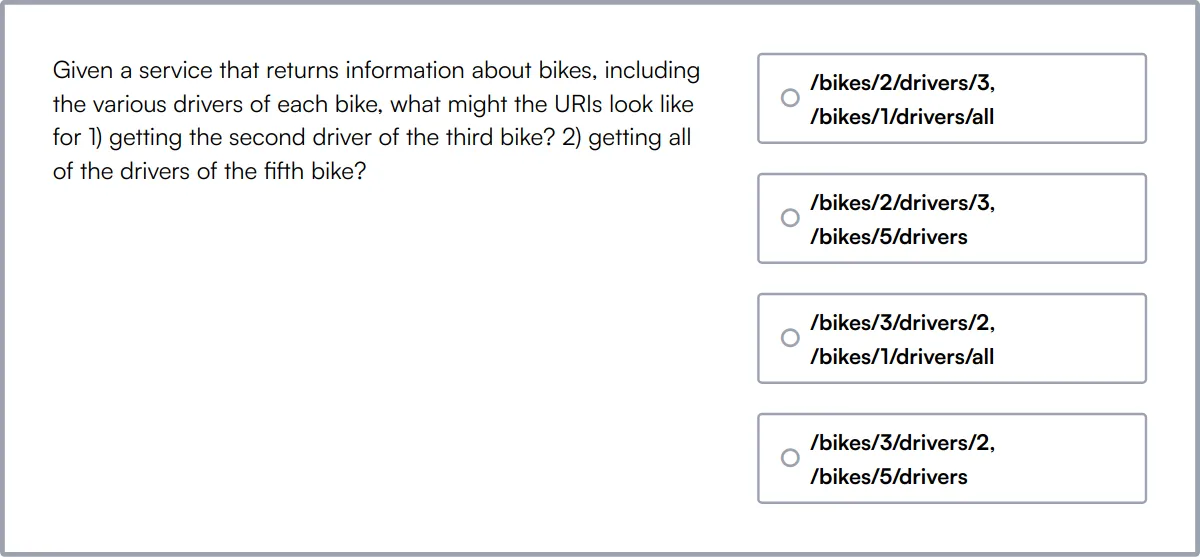
Summary: The 9 key Magento Developer skills and how to test for them
| Magento Developer skill | How to assess them |
|---|---|
| 1. PHP Proficiency | Evaluate the ability to write clean, maintainable PHP code. |
| 2. Magento Architecture | Assess understanding of Magento's modular structure and design patterns. |
| 3. MySQL Knowledge | Check skills in database design, queries, and optimization. |
| 4. JavaScript Skills | Assess ability to create interactive, dynamic web elements. |
| 5. HTML/CSS | Gauge how a developer creates a well-structured, user-friendly interface. |
| 6. API Integration | Evaluate experience in connecting Magento with external services. |
| 7. Version Control Systems | Check proficiency in using Git for code management. |
| 8. Magento Customization | Assess ability to extend and customize Magento functionalities. |
| 9. Performance Optimization | Evaluate skills in improving Magento's speed and efficiency. |
Magento Online Test
Magento Developer skills FAQs
What PHP skills should a Magento Developer have?
A Magento Developer should be proficient in PHP, including understanding object-oriented programming (OOP) and MVC architecture. They should also be familiar with PHP frameworks like Zend or Symfony.
How can I assess a candidate's knowledge of Magento architecture?
Ask candidates to explain the Magento module structure, layout XML, and the EAV (Entity-Attribute-Value) model. Practical tests involving module creation can also be effective.
Why is MySQL knowledge important for a Magento Developer?
Magento relies heavily on MySQL for data storage. Developers should know how to write efficient queries, optimize databases, and understand indexing and normalization.
What JavaScript skills are necessary for a Magento Developer?
A Magento Developer should be skilled in JavaScript, including libraries like jQuery and frameworks like Knockout.js, which Magento 2 uses extensively.
How important is experience with version control systems for a Magento Developer?
Experience with version control systems like Git is important for managing code changes, collaborating with teams, and maintaining project history.
What should I look for in a candidate's ability to optimize Magento performance?
Look for experience with caching mechanisms, database optimization, and code profiling tools. Ask about specific instances where they improved site performance.
How can I evaluate a candidate's skills in API integration?
Ask about their experience with REST and SOAP APIs, including how they have integrated third-party services with Magento. Practical tests can also be useful.
What debugging tools should a Magento Developer be familiar with?
A Magento Developer should know tools like Xdebug, Magento's built-in profiler, and browser developer tools. They should also be adept at reading and interpreting log files.

40 min skill tests.
No trick questions.
Accurate shortlisting.
We make it easy for you to find the best candidates in your pipeline with a 40 min skills test.
Try for freeRelated posts
Free resources



